高一英语必修三第一单元重要知识点讲解(重要词汇-语法等)
高一英语必修三第一单元重要知识点讲解(重要词汇-语法等)教学内容
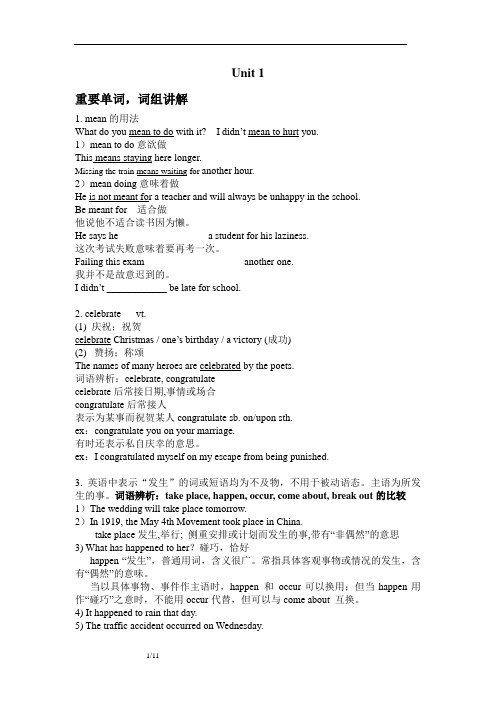
Unit 1重要单词,词组讲解1. mean的用法What do you mean to do with it? I didn’t mean to hurt you.1)mean to do意欲做This means staying here longer.Missing the train means waiting for another hour.2)mean doing意味着做He is not meant for a teacher and will always be unhappy in the school.Be meant for 适合做他说他不适合读书因为懒。
He says he _________________ a student for his laziness.这次考试失败意味着要再考一次。
Failing this exam ___________________ another one.我并不是故意迟到的。
I didn’t ____________ be late for school.2. celebrate vt.(1) 庆祝;祝贺celebrate Christmas / one’s birthday / a victory (成功)(2) 赞扬;称颂The names of many heroes are celebrated by the poets.词语辨析:celebrate, congratulatecelebrate后常接日期,事情或场合congratulate后常接人表示为某事而祝贺某人congratulate sb. on/upon sth.ex:congratulate you on your marriage.有时还表示私自庆幸的意思。
ex:I congratulated myself on my escape from being punished.3. 英语中表示“发生”的词或短语均为不及物,不用于被动语态。
高中英语必修3第一单元单词和短语讲解
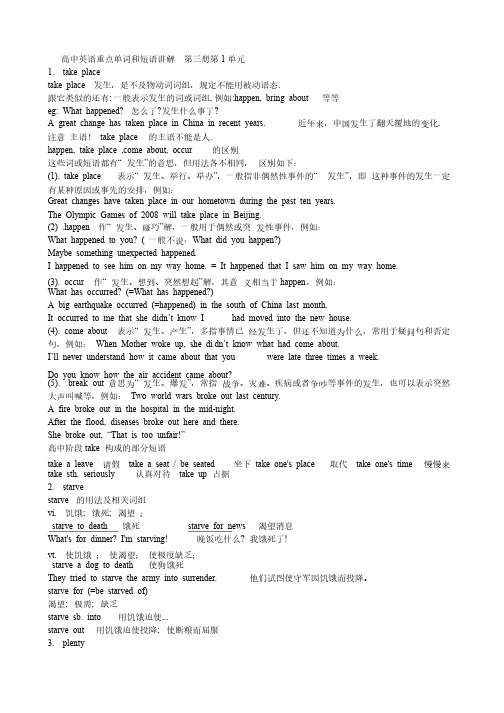
高中英语重点单词单词和短和短语讲语讲解解 第三册第1单元单元1. take place take place 发生,是不及物动词词组动词词组,,规定不能用被动语态. 跟它类它类似的似的还有:一般表示发生的词或词组,例如:happen, bring about等等 eg: What happened? 怎么怎么了了?发生什么事了? A great change has taken place in China in recent years. 近年来,中国发国发生了翻天覆地的生了翻天覆地的变化. 注意 主语! take place 的主语不能是人. happen, take place ,come about, occur 的区别区别这些词或短语都有“发生”的意思,但用法各不相同,区别区别如下:如下: (1). take place 表示“发生、举行、举办”,一般指非偶然性事件的“发生”,即这种这种事件的事件的发生一定有某种原因或事先的安排,例如: Great changes have taken place in our hometown during the past ten years. The Olympic Games of 2008 will take place in Beijing. (2) .happen 作“发生、碰巧”解,一般用于偶然或突发性事件,例如: What happened to you? (一般不说:What did you happen?) Maybe something unexpected happened. I happened to see him on my way home. = It happened that I saw him on my way home. (3). occur 作“发生、想到、突然想起”解,其意义相当于happen ,例如: What has occurred? (=What has happened?) A big earthquake occurred (=happened) in the south of China last month. It occurred to me that she didn’t know I had moved into the new house. (4). come about 表示“发生、产生”,多指事情已经发经发生了,但生了,但还不知道为什么,常用于疑问句和否定句,例如: When Mother woke up, she di dn’t know what had come about. I’ll never understand how it came about that you were late three times a week. Do you know how the air accident came about? (5). break break out out 意思为“发生、爆发”,常指战争战争、灾、灾难、疾病或者争吵争吵等事件的等事件的发生,也可以表示突然大声叫喊等,例如: Two world wars broke out last century. A fire broke out in the hospital in the mid-night. After the flood, diseases broke out here and there. She broke out, “That is too unfair!”高中阶段take 构成的部分短语take a leave 请假 take a seat / be seated 坐下 take one's place 取代 take one's time 慢慢来 take sth. seriously 认真对认真对待待 take up 占据 2. starve starve 的用法及相关词组 vi. 饥饿; 饿死; 渴望 ; starve to death 饿死 starve for news 渴望消息 What's for dinner? I'm starving! 晚饭晚饭吃什吃什么? 我饿死了! vt. 使饥饿饥饿 ; 使渴望; 使极度缺乏; starve a dog to death 使狗饿死 They tried to starve the army into surrender. 他们试图们试图使守使守军因饥饿饥饿而投降。
英语高一必修三unit1知识点
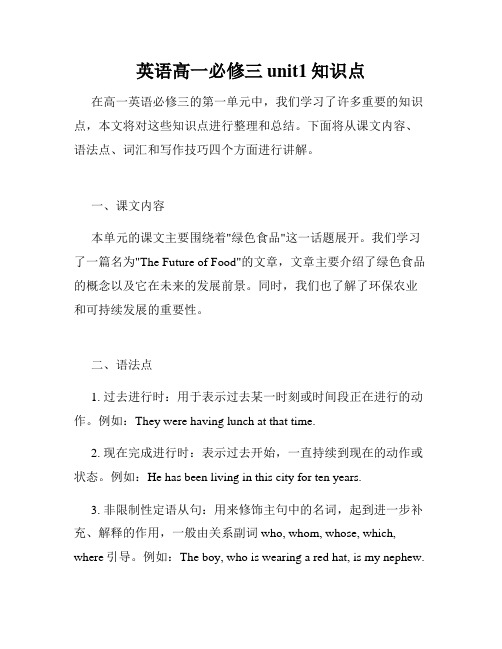
英语高一必修三unit1知识点在高一英语必修三的第一单元中,我们学习了许多重要的知识点,本文将对这些知识点进行整理和总结。
下面将从课文内容、语法点、词汇和写作技巧四个方面进行讲解。
一、课文内容本单元的课文主要围绕着"绿色食品"这一话题展开。
我们学习了一篇名为"The Future of Food"的文章,文章主要介绍了绿色食品的概念以及它在未来的发展前景。
同时,我们也了解了环保农业和可持续发展的重要性。
二、语法点1. 过去进行时:用于表示过去某一时刻或时间段正在进行的动作。
例如:They were having lunch at that time.2. 现在完成进行时:表示过去开始,一直持续到现在的动作或状态。
例如:He has been living in this city for ten years.3. 非限制性定语从句:用来修饰主句中的名词,起到进一步补充、解释的作用,一般由关系副词who, whom, whose, which, where引导。
例如:The boy, who is wearing a red hat, is my nephew.4. 由疑问词引导的特殊疑问句:包括对地点、时间、原因、方式、人物等提问。
例如:Where did you go yesterday?三、词汇1. environmental:环境的2. organic:有机的3. conventionally:传统地4. pesticide:农药5. biotechnology:生物技术6. innovation:创新四、写作技巧1. 遣词造句:在写作时,可以运用丰富多样的词汇和句型来增加文章的表达力。
可以使用形容词和副词来描述事物,运用各种连接词来展示逻辑关系。
2. 开头和结尾:开头要简洁明了地表达主题,吸引读者的注意力;结尾要提出自己的观点或总结全文内容,给读者留下深刻的印象。
高一必修三英语unit 1知识点
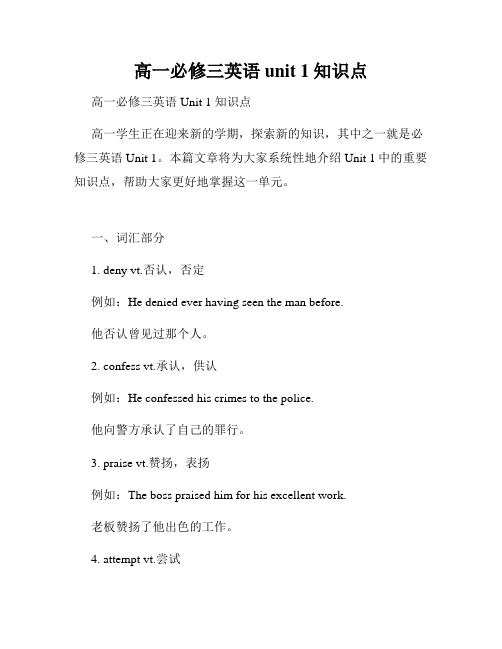
高一必修三英语unit 1知识点高一必修三英语Unit 1 知识点高一学生正在迎来新的学期,探索新的知识,其中之一就是必修三英语Unit 1。
本篇文章将为大家系统性地介绍Unit 1中的重要知识点,帮助大家更好地掌握这一单元。
一、词汇部分1. deny vt.否认,否定例如:He denied ever having seen the man before.他否认曾见过那个人。
2. confess vt.承认,供认例如:He confessed his crimes to the police.他向警方承认了自己的罪行。
3. praise vt.赞扬,表扬例如:The boss praised him for his excellent work.老板赞扬了他出色的工作。
4. attempt vt.尝试例如:He attempted to climb the mountain without any equipment.他试图不带任何装备攀登这座山。
5. hesitate vi.犹豫例如:She hesitated for a moment and then said "yes".她犹豫了一会儿,然后说“是的”。
二、从句部分1. 定语从句定语从句是修饰一个名词或代词的从句,通常使用关系代词或关系副词引导。
注意区分限制性定语从句和非限制性定语从句。
例如:The book that I borrowed from the library is very interesting.我从图书馆借的那本书非常有趣。
2. 时间状语从句时间状语从句用来表示一个动作或事件发生的时间,常用的引导词有when, while, before, after等。
例如:I will call you when I get home.我回家后会给你打电话。
3. 条件状语从句条件状语从句用来表示在某个条件下会发生的动作或事件,常用的引导词有if, unless等。
人教版高中英语必修三Unit 1 重难点知识点总结
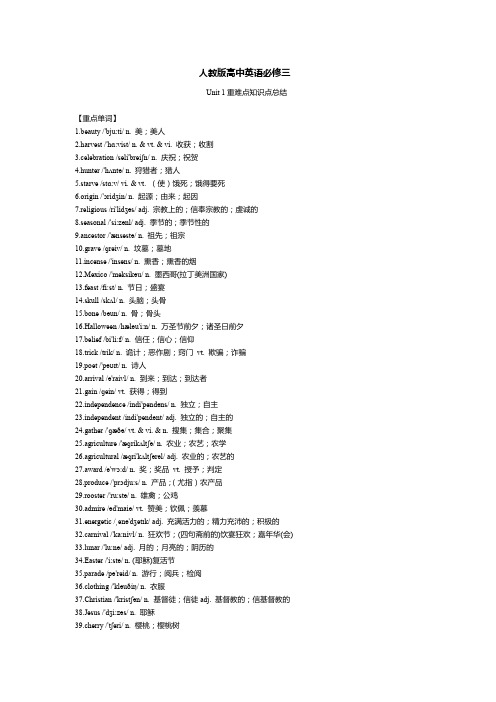
人教版高中英语必修三Unit 1重难点知识点总结【重点单词】1.beauty /'bju:ti/ n. 美;美人2.harvest /'hɑ:vist/ n. & vt. & vi. 收获;收割3.celebration /seli'breiʃn/ n. 庆祝;祝贺4.hunter /'hʌntə/ n. 狩猎者;猎人5.starve /stɑ:v/ vi. & vt. (使)饿死;饿得要死6.origin /'ɔridʒin/ n. 起源;由来;起因7.religious /ri'lidʒəs/ adj. 宗教上的;信奉宗教的;虔诚的8.seasonal /'si:zənl/ adj. 季节的;季节性的9.ancestor /'ænsestə/ n. 祖先;祖宗10.grave /ɡreiv/ n. 坟墓;墓地11.incense /'insens/ n. 熏香;熏香的烟12.Mexico /'meksikəu/ n. 墨西哥(拉丁美洲国家)13.feast /fi:st/ n. 节日;盛宴14.skull /skʌl/ n. 头脑;头骨15.bone /bəun/ n. 骨;骨头16.Halloween /hæləu'i:n/ n. 万圣节前夕;诸圣日前夕17.belief /bi'li:f/ n. 信任;信心;信仰18.trick /trik/ n. 诡计;恶作剧;窍门vt. 欺骗;诈骗19.poet /'pəʊɪt/ n. 诗人20.arrival /ə'raivl/ n. 到来;到达;到达者21.gain /ɡein/ vt. 获得;得到22.independence /indi'pendəns/ n. 独立;自主23.independent /indi'pendənt/ adj. 独立的;自主的24.gather /'ɡæðə/ vt. & vi. & n. 搜集;集合;聚集25.agriculture /'æɡrikʌltʃə/ n. 农业;农艺;农学26.agricultural /æɡri'kʌltʃərəl/ adj. 农业的;农艺的27.award /ə'wɔ:d/ n. 奖;奖品vt. 授予;判定28.produce /'prɔdju:s/ n. 产品;(尤指)农产品29.rooster /'ru:stə/ n. 雄禽;公鸡30.admire /əd'maiə/ vt. 赞美;钦佩;羡慕31.energetic /ˌenə'dʒetɪk/ adj. 充满活力的;精力充沛的;积极的32.carnival /'ka:nivl/ n. 狂欢节;(四句斋前的)饮宴狂欢;嘉年华(会)33.lunar /'lu:nə/ adj. 月的;月亮的;阴历的34.Easter /'i:stə/ n. (耶稣)复活节35.parade /pə'reid/ n. 游行;阅兵;检阅36.clothing /'kləuðiŋ/ n. 衣服37.Christian /'kristʃən/ n. 基督徒;信徒adj. 基督教的;信基督教的38.Jesus /'dʒi:zəs/ n. 耶稣39.cherry /'tʃeri/ n. 樱桃;樱桃树40.blossom /'blɔsəm/ n. 花vi. 开花41.custom /'kʌstəm/ n. 习惯;风俗42.worldwide /'wə:ldwaid/ adj. 遍及全世界的;世界性的43.rosebud /'rəuzbʌd/ n. 玫瑰花蕾44.fool /fu:l/ n. 愚人;白痴;受骗者adj. 傻的vt. 愚弄;欺骗vi. 干傻事;开玩笑45.necessity /ni'sesəti/ n. 必要性;需要46.permission /pə'miʃn/ n. 许可;允许47.prediction /pri'dikʃn/ n. 预言;预报;预告48.fashion /'fæʃn/ n. 样子;方式;时尚49.parking /'pɑ:kiŋ/ n. (汽车等)停放50.apologize /ə'pɔlədʒaiz/ vi. 道歉;辩白51.drown /draun/ vt. & vi. 淹没;溺死;淹死52.sadness /'sædnis/ n. 悲哀;悲伤53.obvious /'ɔbviəs/ adj. 明显的;显而易见的54.wipe /waip/ vt. 擦;揩;擦去55.weave /wi:v/ vt. & vi. (wove/wəuv/,woven/'wəuvn/) 编织;(使)迂回前进56.herd /hə:d/ n. 牧群;兽群57.magpie /'mæɡpai/ n. 喜鹊58.weep /wi:p/ vi. (wept, wept) 哭泣;流泪n. 哭;哭泣59.announcer /ə'naunsə/ n. 广播员;告知者;报幕员60.remind /ri'maind/ vt. 提醒;使想起61.forgive /fə'ɡiv/ vt. (forgave /fə'ɡeiv/, forgiven /fə'ɡivn/ )原谅;饶恕【重点短语】1.mean doing sth. 意味着做某事2.mean to do sth. 打算或企图做某事3.be meant for 打算作……用4.take place 发生;举行5.of all kinds 各种各样的6.starve to death饿死7.be starved of 缺乏8.starve for ... / starve to do... 渴望……9.plenty of 大量; 充足10.be satisfied with对……感到满意11.to one’s satisfaction感到满意是12.in the shape of呈……的形状;以……形式13.in memory of sb./ to the memory of sb. 纪念某人14.dress up 穿衣服;打扮;化装15.award sth.(to sb.) 授予(某人)某物16.award sb. sth.(for ...) (因……)授予某人某物17.reward sb. for... 因……奖赏某人18.reward sb. with sth. 用某物酬劳某人19.admire sb. for... 因……钦佩某人20.look forward to期望,期待,盼望21.turn up 出现;把(收音机等)音量开大些22.turn down 拒绝;把(收音机等)音量开小些23.turn off 关掉24.turn on 打开25.turn out 结果是……26.turn to sb. for help 向某人求助27.keep one’s word 守信28.break one’s word 失信【重点句型】1.Please make sure when and where the accident took place.请查清楚事故是何时何地发生的。
高中英语必修三第一单元知识点总结.doc
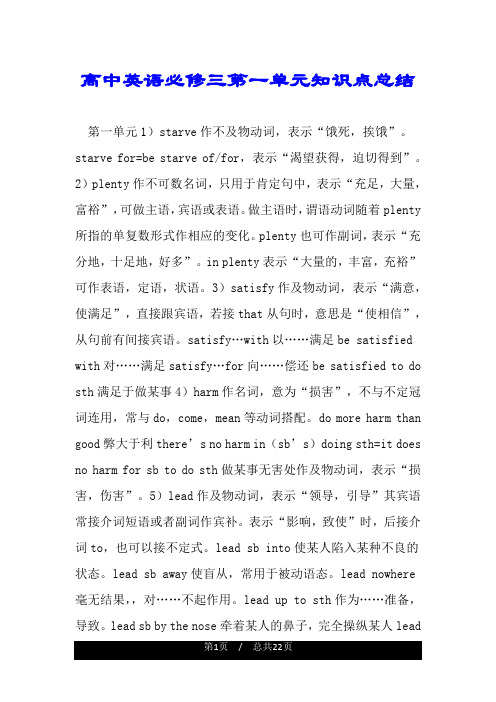
高中英语必修三第一单元知识点总结第一单元1)starve作不及物动词,表示“饿死,挨饿”。
starve for=be starve of/for,表示“渴望获得,迫切得到”。
2)plenty作不可数名词,只用于肯定句中,表示“充足,大量,富裕”,可做主语,宾语或表语。
做主语时,谓语动词随着plenty 所指的单复数形式作相应的变化。
plenty也可作副词,表示“充分地,十足地,好多”。
in plenty表示“大量的,丰富,充裕”可作表语,定语,状语。
3)satisfy作及物动词,表示“满意,使满足”,直接跟宾语,若接that从句时,意思是“使相信”,从句前有间接宾语。
satisfy…with以……满足be satisfied with对……满足satisfy…for向……偿还be satisfied to do sth满足于做某事4)harm作名词,意为“损害”,不与不定冠词连用,常与do,come,mean等动词搭配。
do more harm than good弊大于利there’s no harm in(sb’s)doing sth=it does no harm for sb to do sth做某事无害处作及物动词,表示“损害,伤害”。
5)lead作及物动词,表示“领导,引导”其宾语常接介词短语或者副词作宾补。
表示“影响,致使”时,后接介词to,也可以接不定式。
lead sb into使某人陷入某种不良的状态。
lead sb away使盲从,常用于被动语态。
lead nowhere 毫无结果,,对……不起作用。
lead up to sth作为……准备,导致。
lead sb by the nose牵着某人的鼻子,完全操纵某人leada dog’s life过困难的生活lead sb believe that使某人相信(假的事情或不确切的事情)lead the way带路,带头lead 作为名词,give sb a lead给某人做出榜样,提示某人6)origin 是名词,表示“起源,起因,出身”。
高中英语必修三第一单元重点
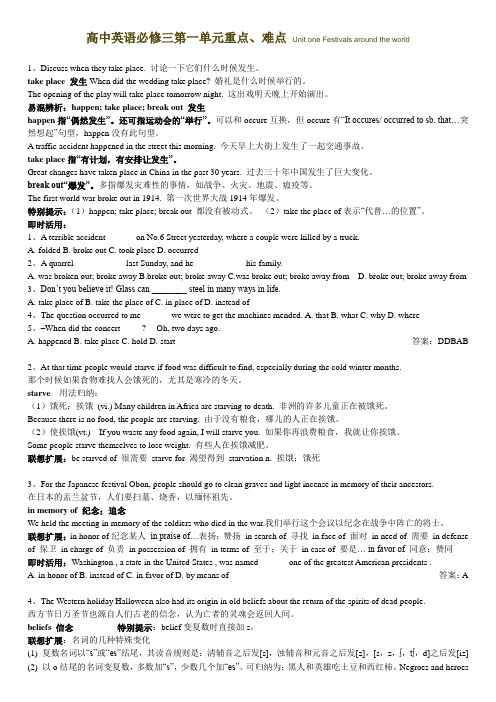
高中英语必修三第一单元重点、难点Unit one Festivals around the world1、Discuss when they take place. 讨论一下它们什么时候发生。
take place 发生When did the wedding take place? 婚礼是什么时候举行的。
The opening of the play will take place tomorrow night. 这出戏明天晚上开始演出。
易混辨析:happen; take place; break out 发生happen指“偶然发生”。
还可指运动会的“举行”。
可以和occure互换,但occure有“It occures/ occurred to sb. that…突然想起”句型,happen没有此句型。
A traffic accident happened in the street this morning. 今天早上大街上发生了一起交通事故。
take place指“有计划,有安排让发生”。
Great changes have taken place in China in the past 30 years. 过去三十年中国发生了巨大变化。
break out“爆发”。
多指爆发灾难性的事情,如战争、火灾、地震、瘟疫等。
The first world war broke out in 1914. 第一次世界大战1914年爆发。
特别提示:(1)happen; take place; break out 都没有被动式。
(2)take the place of表示“代替…的位置”。
即时活用:1、A terrible accident ______ on No.6 Street yesterday, where a couple were killed by a truck.A. foldedB. broke outC. took placeD. occurred2、A quarrel ___________ last Sunday, and he ___________ his family.A. was broken out; broke awayB.broke out; broke awayC.was broke out; broke away fromD. broke out; broke away from3、Don’t you believe it! Glass can ________ steel in many ways in life.A. take place ofB. take the place ofC. in place ofD. instead of4、The question occurred to me ______ we were to get the machines mended. A. that B. what C. why D. where5、–When did the concert_____? ---Oh, two days ago.A. happenedB. take placeC. holdD. start 答案:DDBAB2、At that time people would starve if food was difficult to find, especially during the cold winter months.那个时候如果食物难找人会饿死的,尤其是寒冷的冬天。
高一必修三英语第一单元知识点
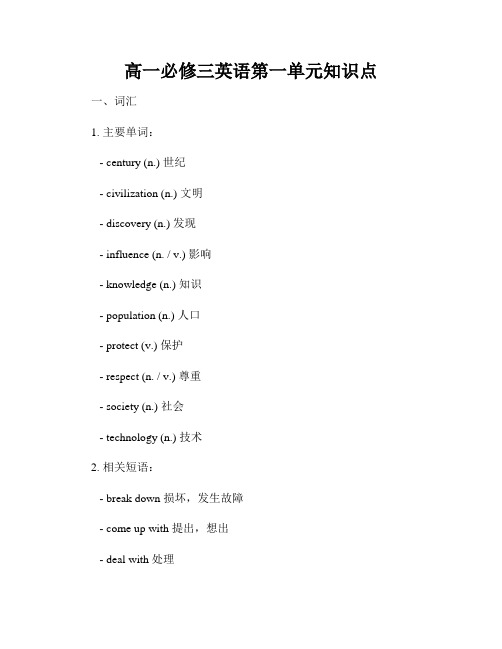
高一必修三英语第一单元知识点一、词汇1. 主要单词:- century (n.) 世纪- civilization (n.) 文明- discovery (n.) 发现- influence (n. / v.) 影响- knowledge (n.) 知识- population (n.) 人口- protect (v.) 保护- respect (n. / v.) 尊重- society (n.) 社会- technology (n.) 技术2. 相关短语:- break down 损坏,发生故障- come up with 提出,想出- deal with 处理- find out 发现,查明- look forward to 期待- make up 编造,弥补- play a role 起作用- take part in 参加- turn to 求助于二、语法1. 一般现在时:表示客观事实、日常习惯等。
- 例句:The sun rises in the east.- 例句:I usually have breakfast at 7 am.2. 时间状语从句:使用when、while、before、after等引导的从句。
- 例句:I will call you after I finish my homework.- 例句:She always listens to music while she is doing homework.3. 直接引语和间接引语:将别人的话转述为间接引语时,需要注意时态和人称的变化。
- 直接引语:He said, "I am going to the park."间接引语:He said that he was going to the park.4. 及物动词和不及物动词:不及物动词后面不接宾语,而及物动词需要接宾语。
- 例句:He plays basketball very well. (及物动词)- 例句:She runs every morning. (不及物动词)三、阅读理解1. 主旨大意题:通过阅读全文,理解文章的主要观点或中心思想。
- 1、下载文档前请自行甄别文档内容的完整性,平台不提供额外的编辑、内容补充、找答案等附加服务。
- 2、"仅部分预览"的文档,不可在线预览部分如存在完整性等问题,可反馈申请退款(可完整预览的文档不适用该条件!)。
- 3、如文档侵犯您的权益,请联系客服反馈,我们会尽快为您处理(人工客服工作时间:9:00-18:30)。
Unit 1重要单词,词组讲解1. mean的用法What do you mean to do with it? I didn’t mean to hurt you.1)mean to do意欲做This means staying here longer.Missing the train means waiting for another hour.2)mean doing意味着做He is not meant for a teacher and will always be unhappy in the school.Be meant for 适合做他说他不适合读书因为懒。
He says he _________________ a student for his laziness.这次考试失败意味着要再考一次。
Failing this exam ___________________ another one.我并不是有意迟到的。
I didn’t ____________ be late for school.2. celebrate vt.(1) 庆祝;庆贺celebrate Christmas / one’s birthday / a victory (胜利)(2) 赞扬;称颂The names of many heroes are celebrated by the poets.词语辨析:celebrate, congratulatecelebrate后常接日期,事情或场合congratulate后常接人表示为某事而庆贺某人congratulate sb. on/upon sth.ex:congratulate you on your marriage.有时还表示私自庆幸的意思。
ex:I congratulated myself on my escape from being punished.3. 英语中表示“发生”的词或短语均为不及物,不用于被动语态。
主语为所发生的事。
词语辨析:take place, happen, occur, come about, break out的比较1)The wedding will take place tomorrow.2)In 1919, the May 4th Movement took place in China.take place发生,实行; 侧重支配或支配而发生的事,带有“非偶然”的意思3) What has happened to her?碰巧,恰好happen “发生”,一般用词,含义很广。
常指详细客观事物或状况的发生,含有“偶然”的意味。
当以详细事物、事务作主语时,happen 和occur可以换用;但当happen用作“碰巧”之意时,不能用occur代替,但可以与come about 互换。
4) It happened to rain that day.5) The traffic accident occurred on Wednesday.occur “发生,出现”,较正式用词,指事情偶然地、意外地发生或思想突然浮在心头。
occur to 有“想起”的意思。
6) The Second World War broke out in 1939.break out (火灾、斗争、疾病)突然发生、爆发7) How does it come about that you were caught by the police?come about “发生”, 往往留意事情发生的缘由。
且许多时候与how 连用。
与happen 用法较接近用take place , happen 和come about 的正确形式填空1.The May 4th Movement _____________ in 1919.2.If anything ___________ to the machine, let me know at once.3.The opening day of the play ___________ tomorrow night.4.Can you tell me how it ___________?4. starve: vt.使饿死vi.饿得要死starve to deathbe starved of/ starve for: 渴望她很孤独,渴望友情:She is lonely, starving for friendship.The motherless children were starved of/ were starving for affection. 渴望母爱他们在沙漠中迷路而饿死。
他们正急需一大笔钱来完成工作。
They got lost in the desert and ____________________.They are _____________ a sum of money to finish their work.n. starvation饿死:die of ____________5. a year/ day of plenty 富有/丰收的年月days/ years of plenty——Have we got enough apples?——Yes, there are plenty in the basket.plenty of +复数n/ 不行数nplenty of eggs/ food/milk… 足够的…6. honour1) 光荣,荣誉(n)They fight for the honour of the country.One must show honour to one’s p arents.2) in honour of 为了纪念A festival is set in honour of the hero.3) an hounour 光荣的人或事情Liu Xiang is an honour to our country.4) 敬重,给以荣誉(v)Children should honour their parents.7. satisfy Vt. Vi. 使满足,使满足Nothing can satisfy him except the best.Some people are really hard to satisfy.sb.be satisfied with 对…满足e.g. She’s not satisfied with her new house.令人满足的:satisfying, satisfactory满足:satisfaction8. please Vt 使开心,取悅…It is difficult to please everybody.Our aim is to please the customers.pleased (人) 兴奋的…开心的Pleasing (物) 令人开心的pleasant (物) 好听的,令人舒适的pleasure 兴奋的事情听到她悦耳的声音我们很兴奋.We are _________ to hear her ___________voice. It is such a ___________ to us.I was very _________ to hear the news.The news was very ___________ to us.9. harm n 损害,损害e.g. He meant no harm to you.( He didn’t intend to hurt you.)do sb harm =do harm to sb=harm sbThe events has harmed the relations between the two countries.10. They offer food, flowers and gift….词语辨析:offer, provide, supplyoffer 主动供应。
offer sth to sb; offer sb sthprovide 供应(所需物,尤指生活必需品)。
provide sth (for sb); provide sb with sth.supply: 供应(所须要或所要求之物)。
supply sth to sb; supply sb with sthWhen I meet difficulty, my roommates will_____me help.他们悬赏找回丢失的珠宝。
They_______a reward for the return of the lost jewels.政府得供应这些老人们吃穿。
The government need to_________these old people with food and clothes.每个月都得供应足够的电。
Electricity should be _________enough every month.11. in memory of = to the memory of sbThe museum was built in memory of the famous scientist.in honor of in charge ofin search of sb. / sth.12.dress up 盛装装扮,扮装装扮You don’t have to dress up. Come as you are.Children love dressing up in Halloween.dress oneself 给某人自己穿衣dress sb 给某人穿衣服你相识穿着白色裙子的那个女孩吗?Do you know the girl who is dressed in a white skirt?Do you know the girl who is wearing a white skirt?Do you know the girl who has on a white skirt?选词填空:wear dress have on put on1.My daughter is now able to herself.2.Mr. Wu always a blue coat in Winter.3.Xiao Wang a white shirt today.4.I like to my hat when I go out in Winter.13. awardn. 奖品,奖项,奖金, 助学金……She showed us the awards she had won.Mary got an award and was able to finish her study.vt. 授予……裁定……award sb sth= award sth to sbThe judges awarded both teams equal points.reward 回报,酬劳他因为努力学习而受奖。
